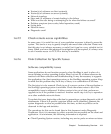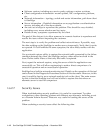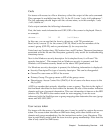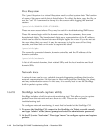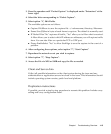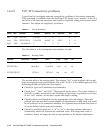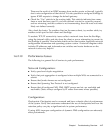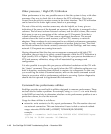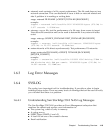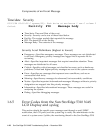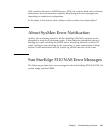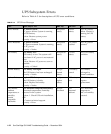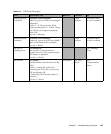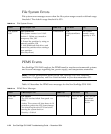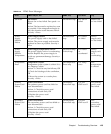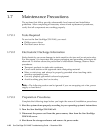
Chapter 1 Troubleshooting Overview 1-19
■ rateread: read contents of a file, report performance. The file read does not use
network connection. This can determine if issue is disk or network related and
also if problem is in reading or writing data.
usage: rateread FILENAME [+OFFSET] TOTALKB [BLOCKSIZE]
example:
support > rateread /vol1/testfile 8192 1024000000 bytes (976.5M) in
0.877 seconds 1.086GB/sec
■ ratecopy: copy a file, test the performance of a file copy from source to target.
Uses network connection and can be used to determine if any network issues
exsist.
usage: ratecopy SOURCE_FILENAME DEST_FILENAME [BLOCKSIZE]
example:
support > ratecopy /vol1/testfile vol1/testout 1024000000 bytes
(976.5M) in 25.116 seconds 38.88MB/sec
■ aratewritewrite a file direct asynchronously. Test performance VS ratewrite.
usage: aratewrite FILENAME [+OFFSET] TOTALKB [BLOCKSIZE]
[MB_PER_COMMIT]
example:
support > aratewrite /vol1/testfile 1000000 4096 Writing 976MB in
4KB blocksize with 0MB per commit. 1024000000 bytes (976.5M) in
14.982 seconds 65.18MB/sec
1.6.3 Log Error Messages
1.6.4 SYSLOG
The syslog is an important tool for troubleshooting. It provides a place to begin
isolating system issues. There are many levels of warnings that can be used to notify
you via email that there is a problem.
1.6.4.1 Understanding Sun StorEdge 5310 NAS Log Messages
The Sun StorEdge 5310 NAS provides an Event Management subsystem that
monitors the chassis and reports event information to:
■ The system log, which is only in memory
■ A syslog server
■ SNMP Traps (SNMP v1 and v2)
■ A local file on one of the created volumes
■ Email notification



